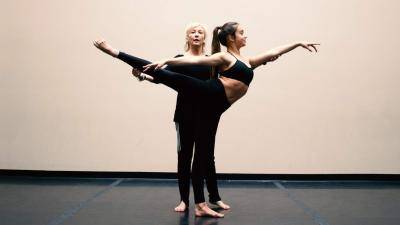If you are considering studying dance in college, it is crucial that you choose the right university for you and your training. Many college dance programs have fine reputations and notable faculty, but they may not be the best fit for you, even if they are well-known. When starting your college search, try to look beyond the name, and really do your research into what the dance program offers. You may be surprised at what appeals to you, or you may find that you were correct in your initial choice. Just remember, there are so many other factors to consider beyond the university name, and if you don’t get into your top choice program, having other options is essential. Remember, stay open-minded and true to your unique goals.
... labels are just labels.
Here are four elements to consider when you begin your college search:
1. Look beyond the name, and do your research.
Find the right program for YOU.
The best example I have of this notion is from my time working in the wine industry. People would come in to the gift shop and right away would want to purchase the most expensive wine. I first would ask if it was a gift for someone else, or for themselves. Nine times out of ten, it was for themselves, and they had never tried it. Now, from a retail standpoint, I could have just let them spend their money however they’d like. But from an educational standpoint, it was important to me that they got what they liked. So, we would do a blind taste test, and they were always shocked when the one they liked the best wasn’t necessarily the most expensive. I have had incredible high-end wine, and I’ve also tasted some that I really wasn’t impressed with. All of our tastes are different, and I believe that it’s important to look beyond the label. Some would still buy the high-end wine, but most were okay with spending less money and getting way more for it. My point with this comparison, is that labels are just labels. If that’s all that matters to you, then you’ll probably miss out on unique opportunities.
What is it that draws you to the program? If it’s reputation, then remember that it is probably way more competitive in terms of acceptance rates and getting scholarships. Some of the more known institutions will probably mean more expensive tuition and cost of living, so scholarships are a huge factor to consider. If you’re choosing based on location, then branch out and see what other dance programs are like in the area. If it’s the size, then narrow down your search based on that. Big city versus a small town, large programs versus more intimate; They all have very different things to offer. The online resources you have at your fingertips to do this research make it so much easier than it used to be!
Taking your first step onto the campus will tell you a lot.
Famous dance universities with well-known dance professors probably offer fantastic programs. Don’t get me wrong, I went to very reputable institutions. I’m not trying to steer you away from them. However, I also found so many other dance programs later in my career that I wish I had known about back then. The trouble with only wanting the big-name school or the exclusive conservatory program is that you’re limiting your options, and you’re probably not exploring lesser known schools. There are amazing faculty all over, and some at schools that won’t break the bank. As mentioned before, tuition and student loans are something to think about now, so that it doesn’t catch up with you later. Seek out information regarding financial aid and scholarships. There is a ton of free money out there that so many people are not taking advantage of. Sure, it may take an essay and a letter of recommendation, but it could cover a semester’s worth of tuition.
2. What is it you are looking for and where do you see your career going?
Find the right training for YOU.
One of the most important things I remind my students is to keep an open mind. You probably have very specific goals and dreams, and you should work hard to see them fully realized. But the more open you remain, the more possibilities you will have for your future. First, choose a dance program that has a strong foundation in the techniques you want to further your training in. Second, make sure they also offer other resources you can utilize to help you be a well-rounded dancer. Having a larger skill set will not only make you more hirable, but will also add to your overall quality as an artist.
Do you want to earn a BA or BFA degree? If you don’t know the difference, do your homework. What will having their name on your diploma get you? What is the department’s mission statement? Where are the alumni of the program working? What is the curriculum like? How do they prepare you for transitioning into your career? These are all important questions to ask.
Look into their relationships with professional dance companies and their guest artist program. Some of those connections will come in handy when you’re done with school. Make sure to research your faculty. Look beyond their name, and see what they’ve done in their careers. I watch so many students go through their college career without knowing much about their professors, other than what they teach them. An understanding of your prospective professors’ background and experiences will only aide in your education, and will probably inform your decision.
3. Visit the school and meet other students that attend the university.
Find the right environment for YOU.
A day in the life of a student at the school you’re considering is important. Once you’ve narrowed down your top picks, try to visit the dance colleges. Taking your first step onto the campus will tell you a lot. Ask if you can sit in on dance classes, and try to talk to current majors. Get a feel for what your schedule and work-load will be. Find out what students think about the program and the school as a whole. Hearing the faculty’s explanation of the degree will give you a great overview of what the program is about. Getting a student’s perspective will give you a much more in-depth look into what your day-to-day will be like. You will have a lot of classes with the same students for four years (unless you graduate early, or take a bit more time to finish). Ask about the environment as a whole. What type of community does the program create, and is that something that appeals to you or not?
Some smaller dance universities probably have a more set structure in terms of curriculum. You will also work more closely with your professors if the class sizes are smaller. If you’re someone that can benefit from more one-on-one attention, then seeking these types of schools is the direction you should go. Smaller programs may also offer more performance opportunities, simply based on the number of majors.
The more open you remain, the more possibilities you will have for your future.
Larger programs may give you a little more freedom in terms of the track you want to take. Additionally, they will typically offer a wider variety of courses to choose from. If you can thrive in larger class settings and are self-motivated, then this might be a better route to take. Ask if they have policies on when you can start performing, as some programs don’t allow you to perform in your first year. Bigger numbers in terms of majors also means a more competitive audition process.
4. The dance training you receive is priority, but the rest of your education and college experience is important too.
Find the right university for YOU.
Make sure you look at the university as a whole and what else it has to offer. Universities have so much to offer you. Recognizable schools are famous for a reason. You may spend most of your time in the dance studio, but there’s a big life outside of that as well. Get a tour of the campus, check out the dorms, see what is nearby. Will you be happy there when you’re not dancing? You may have many other interests that you’d like to pursue as well. If you’re considering a minor, or perhaps a double major, you should also visit those departments.
If you’re like most college students, you’ll need to get a job while you’re in school. Visit the student services office and inquire about campus jobs. Maybe you teach at your studio right now. See if there are studios nearby that you can drop off your resume at. School will be your number one priority, but your overall college experience matters as well. Like every commencement speech you’ve ever heard will tell you, this is an exceptional time in your life, so make the most of it.
No matter what direction you choose to take, the most important part is that it is an informed decision. Don’t put all your eggs in one basket just because “so and so went there” or because you believe it’s “the best” program out there. It may be “the best” program in a certain aspect, but that doesn’t mean that it’s the best fit for you. What matters most is that you will receive the training you need and the BA or BFA degree you want in order to support the career you desire. This is a huge investment you’re making, so make sure it serves you. Remember that no matter how much you research, it still may be different once you’re there. But the more time you put into investigating, the more likely you’ll be prepared for all of the hard work that lies ahead.




